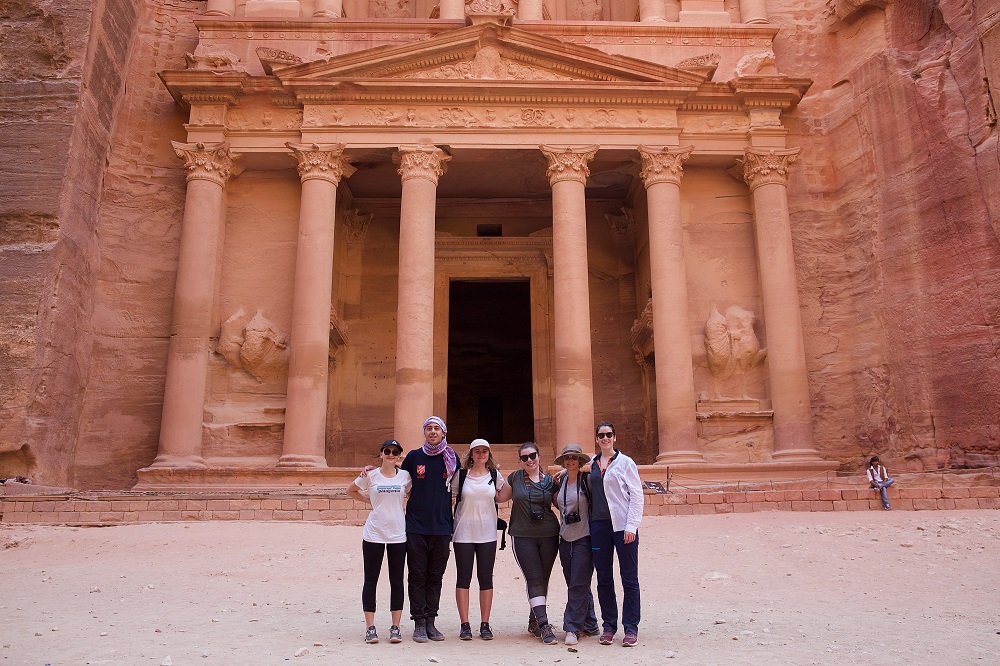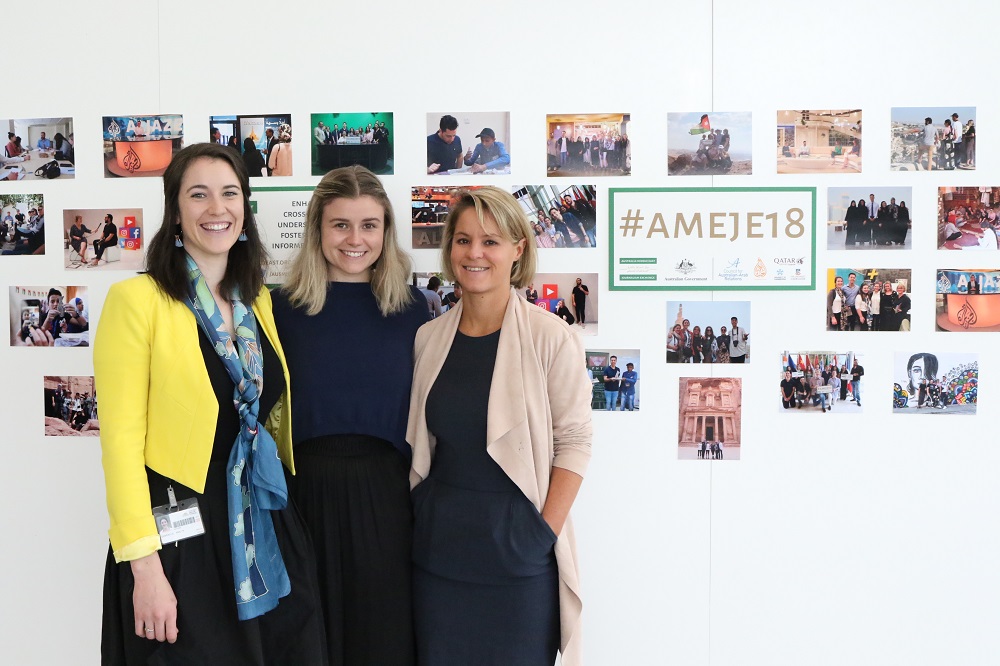Suzanne Lazaroo
5 September 2018: From forays into the formidable media machinery of broadcasting giant Al Jazeera, to early morning photo sessions as dawn broke over the local souk – three University of Canberra journalism and communications students had an eye-opening, stereotype-busting experience in the Middle East recently, as part of the Australia-Middle East Journalism Exchange (AMEJE) program.
A not-for-profit organisation, AMEJE aims to improve cross-cultural understanding by nurturing better informed journalism. The exchange programs include academic and cultural components, as well as professional and working field visits.

The six participants of #AMEJE18 gained fresh perspective on the Middle East, and forged amazing connections with the people they met on their trip. Photo: supplied
“Even before they set foot in another country, participants take part in a 10-week academic program,” Managing Director of AMEJE, Dr Scott Bridges said. Dr Bridges also teaches journalism and communications at the University.
The University’s Ruby Becker, Sarah Hill and Gabrielle Kneipp were joined on the #AMEJE18 trip in July to Jordan and Qatar by University of Adelaide students Ashleigh Roberts, Benito Carbone and Dale Carter.
In addition to visits with Al Jazeera in Doha and Arab Reporters for Investigative Journalism (ARIJ) in Amman, participants went to Jordan’s historical city of Petra and the Jerash refugee camp, Middle East University in Amman, non-profit organisations, museums, mosques and other cultural sites.
Ms Becker also found herself on the other side of the camera when she was interviewed on local talk show Donya Ya Donya, on Jordan’s Roya TV. It was an enjoyable but intense experience – particularly since she was receiving simultaneous English and Arabic translations via her in-ear headset.
The participants found that the trip transcended many expectations they had about the places they were visiting, mainly through the connections they forged with everyday people.
“I didn’t expect to build so many relationships, make so many connections. It turns out, cross-cultural communication doesn’t have to be complicated,” Ms Becker said.
It made them consciously consider representation and stereotypes, particularly when it came to portrayal in the media.
“One of the cliches about travelling is that it is life-changing,” said Ms Becker. “But this trip truly did challenge many ideas I had. I just scratched the surface, learning about the complexities of the region – yet that’s still so much more than I knew before. I’m certainly more aware of how the region is often misrepresented in Western media.”
On her return, Ms Hill found that people kept asking her whether the places she had visited were safe.
“I thought it was such a strange question,” she said. “Jordan especially has been a safe haven for people escaping conflict in the region, for years now.
Gabrielle Kneipp, Ruby Becker and Sarah Hill at a presentation at the University of Canberra, where they shared their experiences in the Middle East with a rapt audience. Photo: John Masiello
Each participant worked on individual projects during the trip.
“I wanted to learn about Jordan and Qatar by talking to people about their lives and their passions. I think that’s how you really get to know a place,” Ms Hill said. “I interviewed a lot of different people, who were interesting and engaging, and keen to share their stories.”
Her interviewees were an eclectic bunch, ranging from a photographer to a guitarist, a musician, artist and filmmaker.
“Meeting the journalists at Syria Direct and ARIJ was also incredibly inspiring,” Ms Hill said. “The power and responsibility of journalists to speak the truth and tell the human side of events really hit home. It also cemented how much I want to be a journalist – I’ll take the advice they gave me into a career in journalism, absolutely.”
For Ms Kneipp, the best part of the trip was getting to work in the field. One of her interviews was with Rana Husseini, the Jordanian journalist and activist who exposed honour crimes in the country, and campaigned for stronger laws against them; another was with activist Hanaa McDady, who has worked with refugees, particularly women and children.
“We also visited the Petra National Trust, where they teach pottery skills to children from nearby villages, so that when they grow up, they might become involved in the conservation of the site themselves.
“Everyone we met was so warm, they really gave so much of themselves,” she said.

One of the #AMEJE18 visits was to the ancient city of Petra, where participants had a closer look at conservation efforts. Photo: supplied
The Petra site visit was of particular interest to Ms Becker, whose project focused on the destruction and preservation of heritage, and how that affects identity. “I’ve always thought of heritage as the tangible remains of history, but from talking to a 14-year-old-girl in Jordan, I learned about intangible heritage,” she said.
Professional meets aside, Ms Kneipp – a member of a dragon boat team in Australia – managed to link up with the Doha Wireless Warriors in Qatar, a dragon boat team for cancer survivors and supporters. She not only went out paddling with them, but managed to interview team members.
“The most powerful form of learning is via experience,” Mr Bridges said. “This is the fifth study tour we’ve done since 2015, and we have another coming up in November, when we’ll be taking five students from Deakin University to Morocco. We’re always looking at providing a far-reaching experience that will resonate for years.”
It certainly will for Ms Becker, Ms Hill and Ms Kneipp.
“The trip made me even more motivated to be a journalist,” Ms Becker said. “The media visits in particular were so inspiring, just seeing the challenges they face and how they overcome them. Journalism is so high-stakes there, and they always try to make it about the people, to raise awareness and make people care.”
“I feel like no matter what I end up doing, this trip is going to inform the decisions I make, how I build relationships and interact with people. When I go on to work in the media, I will always think of how I frame things, and work to avoid misrepresentation or pushing stereotypes.”
The #AMEJE18 study tour was supported by the Department of Foreign Affairs and Trade’s Council for Australian-Arab Relations (CAAR), the Changing Lives program, Qatar Airways, the Embassy of the Hashemite Kingdom of Jordan in Australia, and the Embassy of the State of Qatar in Australia.



